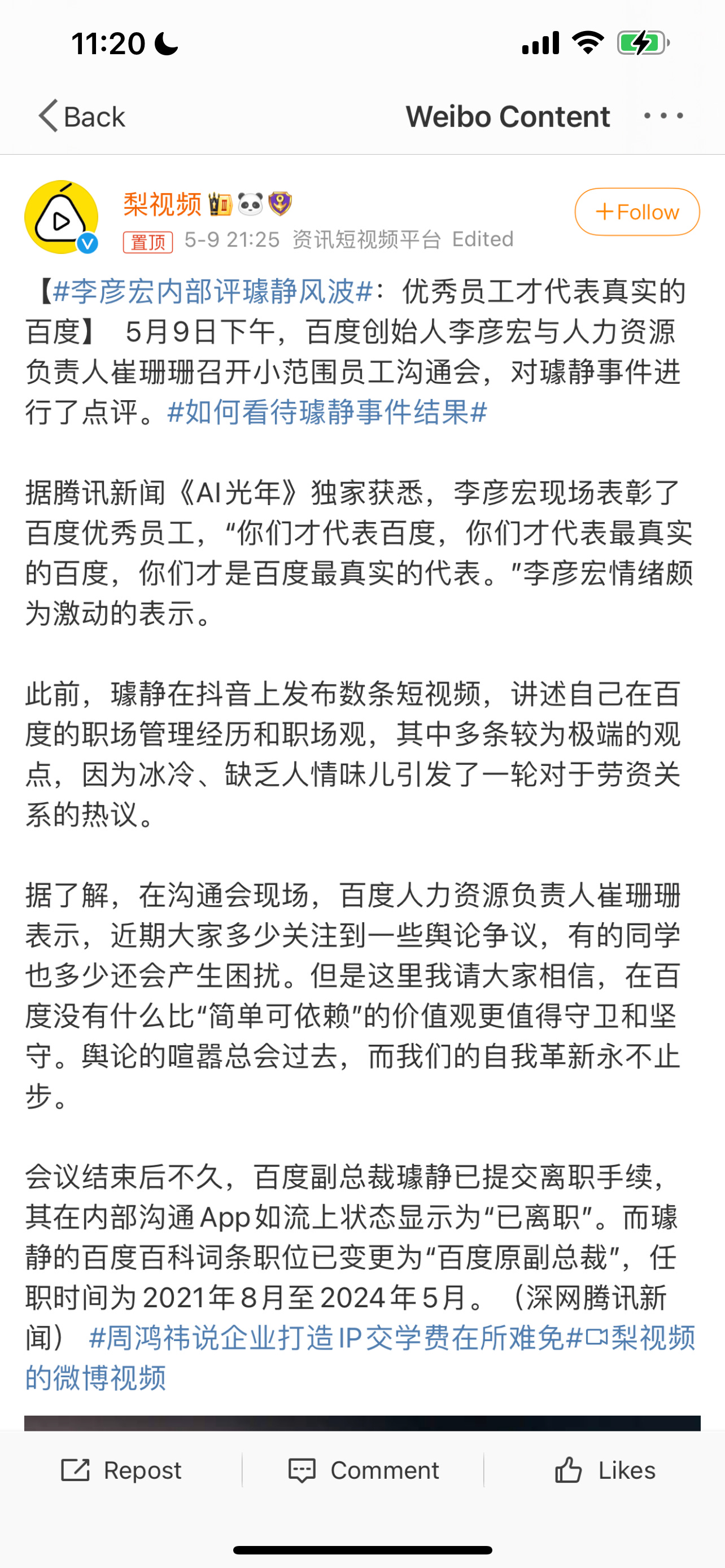The Aftermath of Baidu's PR Crisis
Baidu's response (spoiler alert: bad), its problematic corporate culture, and why Chinese netizens are so mad
The recent Baidu PR crisis started with its own PR chief.
Qu Jing, Baidu’s PR Chief, sparked a public outcry in China for her out-of-touch management style and endorsement of toxic work culture. Her social media videos—which she posted at will—included remarks such as "I'm not your mother or mother-in-law; I only care about results,” and “If you work in public relations, don’t expect weekends off,” she said in a third video. “Keep your phone on 24 hours a day, always ready to respond.”
The Baidu PR department has probably been working 24/7 since the drama unfolded a week ago. CNN, the Financial Times, and all major U.S. media outlets have written about it, and the discussion in China is ubiquitous on social media and in the news.
“A lot of what she said really struck a nerve, because people feel that in their own workplaces very often. The fact that she said it in a way that’s so direct and in your face, it just generated this kind of emotional response,” I shared with CNN and FT.
So, in this post, instead of recounting the one-week old tale, I will analyze the aftermath of the bizarre turn of events, Baidu’s crisis PR responses, and what it says about Baidu’s corporate culture.
For starters, the PR incident caused Baidu's stock prices to tumble, the PR Chief to lose her job, and discussions around how executives' personal brands affect their companies on Chinese social media.
A day after the PR chief deleted all her previous videos, she apologized on her social media, stating,
"Before posting the videos, I did not seek company approval, did not follow the appropriate procedures, and did not represent the company’s stance. I apologize for this."
From a comms perspective, her statement came across as forced and too late for redemption. It was clearly crafted from Baidu’s standpoint to frame her actions as those of a rogue employee, thus absolving the company of any blame. But let’s not forget that Qu Jing was a top executive, leading all external communications, and even though her social media strategy backfired, it was intended to expand Baidu’s direct communication channels with the public. Posting the statement on her personal social media account (Wechat moment) weakened the apology’s effect. Baidu is not off the hook, but the attempt to sever ties and shift blame onto Qu Jing reflects a desperate effort to land a scapegoat.
And then, in less than a day of her apology, she was fired.
As part of the crisis cleanup, Baidu’s founder, Robin Li, and Cui Shanshan, Baidu’s HR head and Secretary-General of Baidu’s Culture Committee, called a small-scale employee townhall, during which Robin applauded the “excellent employees” (优秀员工). Instead of Robin, the HR head addressed the recent controversies. She reassured employees that Baidu’s core values, which are simplicity and reliability (简单可依赖), are worth upholding despite any external noise. “The noise of public opinion will eventually subside, but our commitment to self-improvement will never stop” (舆论的喧嚣总会过去, 而我们的自我革新永不止步) she said during the internal meeting which was allowed to be reported by a (likely friendly) Chinese news outlet.
The #李彦宏内部评璩静风波 (#Robin Li comments on Qu Jing crisis) was a trending topic on Chinese social media, and the same message was reposted across channels (Ivy: typical. It’s called 铺稿). However, the Baidu founder’s response that “excellent employees represent the real Baidu” (优秀的员工才代表真实的百度) is a weak rebuttal compared to the magnitude of the troubles.
Allow me to play the devil’s advocate for a second: wasn’t Qu Jing trying to be excellent by putting herself out there spewing controversy to drive traffic and reach her own short video viewership KPIs? What is Baidu’s definition of “excellence” anyways? Robin did not directly comment on the Qu Jing incident and instead let HR have the final say. Questions remain: how did someone like Qu Jing rise to the company's top echelon if the internal culture a culture of meritocracy?
Qu's firing is rumored to have been executed by Robin’s wife, which adds another dimension to Baidu’s internal governance snafu. An excellent article analyzes the aftermath here (in Chinese).
The incident unleashed a wave of critical response on Chinese social media. The comments broadly fall into one of the following sentiments:
There is no shortage of executives, just like the fired PR chief at Baidu; they are the source of Baidu’s organizational decay.
Baidu has always been aggressively profit-first, and the culture drives the toxic internal dynamic.
Baidu’s dominant market position is a result of monopoly power, because companies like Google cannot enter.
Baidu has “big company disease” 大公司病 that is prevalent in Chinese big tech. (See exhibit A)
With these sentiments in mind, And then Baidu did another thing.
On May 11, Baidu released a meme-ridden video titled "The Breeze of Simplicity Blows Everywhere." (简单之风吹满地). It’s a hopeless attempt to be self-deprecating and poking fun at Baidu’s culture. The video attempted to show Baidu's commitment to eliminate "big company issues" like bureaucratic inefficiency and sycophancy. The video urged employees to uphold Baidu's culture and help the company improve. The proposed solution, according to the video, is “do the right thing.” Very specific, indeed.
Baidu’s official WeChat account stated that the video had been in production for a month, but the release date also happened to be the day after Qu Jing was fired. The WeChat post tried to downplay the significance of the PR crisis. In the released speech, the HR head said: “I think it's not surprising for a company that's nearly 25 years old to encounter problems. What's not OK is unable to view these issues clearly and rationally." (我觉得,公司已经快25年了,出现问题不奇怪,无法清醒和理智地看待才是不对的).
If the intention behind the video was likely to use self-deprecating humor to demonstrate Baidu's commitment to reform those "big company problems" and emphasize its "simple and reliable" corporate culture, the result was, at best… meh.
The video did not make much of an impact online, with those who viewed it expressing indifference and skepticism. Some netizens pointed out that the video itself was a product of "big company problems," with language and imagery tailored to please higher-ups rather than addressing and solving issues.
The backlash against Qu Jing's statements and the lukewarm reception of the crisis-control corporate video reflect a disconnect between management's vision and the basic needs of employees. The complicated internal structure of large corporations like Baidu makes “simplicity” and “reliability” goals almost impossible to achieve. For executives, "The Breeze of Simplicity Blows Everywhere" symbolizes a hopeful future, but for regular employees, it feels like another instance of leaders indulging in self-congratulatory behavior.
I will end the piece with a quote I shared with CNN’s Nectar Gan:
“When companies demand complete loyalty, time and energy from their employees, employees feel there’s no reciprocity or reward for their sacrifice or contribution, especially when things are slowing down. That becomes the central conflict.”
And no amount of good PR can solve that.





